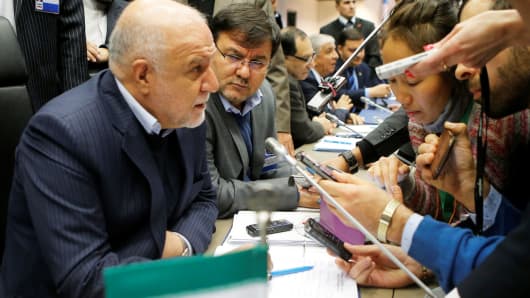"It's a red line for Iran to reduce its production, to contribute to a new cut in production. Iran hasn't produced any more oil in the previous months and it's not Iran's responsibility to manage the situation," Bijan Zanganeh, Iran's oil minister, told CNBC's Hadley Gamble Thursday.
"It's the responsibility of the countries that have produced more and more and have collapsed the market with more oil and extra oil and Iran has no responsibility for this situation," he added.
He repeated, "It's a red line for Iran not to cut one barrel ... Iran should be excluded from any decision."
[caption id="" align="alignnone" width="530"]
 Heinz-Peter Bader | Reuters Iran's Oil Minister Bijan Zanganeh talks to journalists during a meeting of the Organization of the Petroleum Exporting Countries (OPEC) in Vienna, Austria, November 30, 2016.[/caption]
Heinz-Peter Bader | Reuters Iran's Oil Minister Bijan Zanganeh talks to journalists during a meeting of the Organization of the Petroleum Exporting Countries (OPEC) in Vienna, Austria, November 30, 2016.[/caption]Saudi Arabia and Russia increased output in the summer in a bid to prevent prices rising too high ahead of a re-imposition of U.S. sanctions on Iran, which came into effect in November.
Zanganeh's comments come as OPEC producers meet in Vienna, Austria, to decide their strategy on oil production amid a renewed slump in oil prices. Non-OPEC producers including Russia will join them on Friday for talks on whether to cut oil output or maintain levels amid the lower price period.
Oil prices fell around 4 percent Thursday morning�after Saudi Arabia's energy minister said that a cut of 1 million barrels per day would be enough for OPEC and its allied oil producers. Markets were expecting a deeper cut but Russia has signaled it's not keen on reducing output.
Iran has repeatedly opposed Saudi Arabia's strategy�on cutting production given the pressures its oil industry has been facing in recent years, and with the latest sanctions.
US meddling?
The U.S. is anxious that any production cuts agreed by OPEC, on top of its own sanctions on Iran, will limit supply and prompt global oil prices to rise and hit its own consumers hard. President Donald Trump has tweeted numerous criticisms of OPEC, most recently on Wednesday when he said "hopefully OPEC will be keeping oil flows as is, not restricted."
Showing the extent of its concern, the U.S. sent its special representative for Iran, Brian Hook, to Vienna to speak to Saudi Energy Minister Khalid al-Falih met on Wednesday, ostensibly to discuss OPEC's direction on oil output cuts.
Iran is not happy about Hook's arrival in Vienna and Zanganeh joked about the U.S. trying to join OPEC.
On Thursday, Zanganeh said: "I thought he was coming here to join OPEC. But if the U.S. doesn't want to join OPEC, it's unprofessional behavior to come here and have meetings on some member countries and to put pressure on them about what to do. It comes after the tweet from President Trump instructing OPEC what to do and not to cut production."
"I'm sure most OPEC members cannot accept taking instruction from the president of the U.S. on what to do," he added.
Hook's arrival in Vienna is telling for RBC Capital Markets' Global Head of Commodity Strategy Helima Croft who said geopolitics are "clearly intruding into the OPEC proceedings."
"The fact that the U.S. special envoy for Iran is reportedly in Vienna at the moment means that the issue of sanctions will cast a significant shadow over the discussions," she told CNBC Wednesday, adding that Hook's decision to meet Al-Falih "before he meets with anyone else from OPEC is causing considerable consternation with certain delegations."










